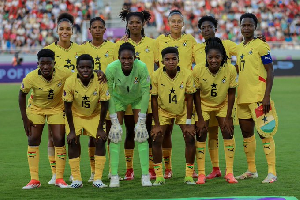Reptiles are increasingly becoming one of the world’s endangered species. In Ghana, some reptiles are consistently dying out, becoming extinct owing to some factors including human activities.
Of all delicacies, people would prefer reptile meat. Some even use these animals for medicinal processes, leather among others.
Each year on October 21st, people across the nation observe National Reptile Awareness Day. Created not only for reptile lovers to celebrate, but National Reptile Awareness Day also promotes education, conservation, and appreciation for reptiles. It is a day to learn about their natural habitats and the ecological threats that they are facing.
As the world marks World Reptile day today, www.ghanaweb.com puts the spotlight on some rare endangered reptiles gradually fading away in Ghana.
Turtles

Though turtles live in or around water bodies, they are not amphibians but reptiles.
Sea turtles are long-living marine reptiles with a unique life history. These gentle giants were common visitors to our beaches but the increasing rate at which they are being destroyed has greatly reduced their number.
Eight species of sea turtle roam the seas around the world: green, leatherback, loggerhead, black, hawksbill, Kemp’s ridley, olive ridley and flatback. In Ghana, olive ridleys and leatherbacks are known to nest, but green sea turtles also have been seen offshore and occasionally are captured in nets.
Most sea turtles found in Ghana are olive ridleys, which are almost 3 feet long, weighing about 80–100 pounds. A few leatherbacks nest every year on the beaches of Ghana. In the past, green sea turtles have nested on the beaches of Ghana, but recently they have disappeared.
Turtle meat and eggs are highly desirable in Ghana, threatening the lives of the reptiles. Though they don’t plan to fish specifically for these reptiles, they take advantage of occasional turtles in their nets, believing these catches are a gift from God.
These threats are present in most other coastal communities in Ghana and on the West African coast, but a small number of communities do protect sea turtles, as some local religions worship the turtles as gods.
Conservationists in Ghana are warning of possible extinction of sea turtles if more care isn't taken to protect them. Meanwhile, they have set up a conservation site for turtles to rescue such reptiles and the killing or capture of such animals is now punishable by law.
The conservation site works with community volunteers who patrol the beaches to deter potential poachers.
West African slender-snouted crocodile

This reptile is one of the rarest and least studied crocodilians in the world. This remarkable species has a long, narrow snout perfect for capturing fish, and individuals have been known to reach 4 m in length. The slender-snouted crocodile is the only member of its genus, and has been identified as a priority species by ZSL’s EDGE of Existence programme, meaning it is highly Evolutionarily Distinct and Globally Endangered.
The species is believed to have undergone rapid population decline throughout its range and, in Ghana, it is threatened by habitat destruction, prey reduction, and human-crocodile conflict.
The West African slender-snouted crocodile population in the Obuasi Municipality is no exception – here crocodiles are threatened by increasing conflicts with fish farmers, who complain of crocodiles raiding their fish ponds, and kill them in retaliation.
Ghana Worm lizard

The Ghana worm lizard (Cynisca kraussi) is a worm lizard species in the family Amphisbaenidae. It is endemic to Ghana.
The reptile has been listed on the International Union for Conservation of Nature (IUCN)’s Red list of Threatened Species 2013. This species is only known from the original description, which reported it from the Bandai Hills in the Ashanti Region in southeastern Ghana
According to the IUCN, the Bandai Hills are threatened by habitat destruction from agriculture and gold mining. In 2006, the Ghana government proposed a large hydroelectric dam in the area which would severely alter all aspects of the Bandai Hills (Environmental Resources Management and SGS Environment 2006).
While these processes are likely to represent threats to this population within the region, as it is known only from its original description and may consequently be more widespread, it is not known whether these represent major or localized threats to this worm lizard.
Tortoise

Tortoise is among 154 reptile species in Ghana regarded as endangered.
Tortoises, like turtles are struggling to survive, threatened by trade, habitat loss and hunting. The heavily-armoured, clawed feet and slow-moving reptiles live long; 80 and 100 years, sometimes longer than humans.
They are however gradually fading, worldwide and in Ghana here. Humans have also eaten tortoise meat for centuries. In fact, many of the extinct tortoise species were hunted to death.
Their meat is however not the only thing people are after. Tortoises are taken from the wild for the pet trade, killed for their decorative shells, and their eggs are also stolen for consumption.
In Ghana here, the species remain endangered with just a few available even for tourism purposes.
A multi-purpose West Africa Tortoise Research Centre has been opened at Assin Homaho, a farming community in the Assin South District of the Central Region.
The Centre, first of its kind in Africa, is solely devoted to breeding, studying, protecting land tortoise among other species.
General News of Monday, 21 October 2019
Source: www.ghanaweb.com













